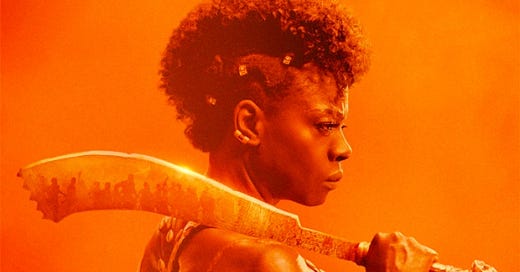The Woman King
Director Gina Prince-Blythewood's historic drama offers rousing action, performances and representation.
Film Yap is a reader-supported publication. To receive new posts and support my work please consider becoming a free or paid subscriber.
Representation matters. I saw it in the trailers glimpsed before “The Woman King” (now in theaters) – among them “Till,” “She Said” and “Devotion” – and I certainly saw it in the movie itself. Even to me – a white, straight, cisgender man – it was powerful to hear my largely black audience’s applause at the film’s conclusion and to see beautiful sisters of color decked out in dashikis dancing their way down the aisles on their way out of the auditorium.
Viola Davis stars in this 1820-set historical action-drama as General Nanisca. She’s the leader of the Agojie, an all-woman group of warriors tasked with protecting the West African Kingdom of Dahomey (today’s Republic of Benin). Nanisca answers to King Ghezo (John Boyega) and works alongside fellow female fighters Izogie (Lashana Lynch) and Amenza (Sheila Atim) to fight off enemies both foreign (Ralph and Joseph Fiennes’ nephew Hero Fiennes Tiffin embodies slavers as the Portuguese Santo Ferreira) and domestic (Jimmy Odukoya plays Oba Ade, representative of the raiding Oyo Empire) looking to enslave their people.
Nanisca, Izogie and Amenza hope to fortify their numbers by bringing in new blood. This comes primarily in the form of Nawi (sensational South African actress Thuso Mbedu of Barry Jenkins’ Amazon Prime miniseries “The Underground Railroad”), a headstrong young woman whose father turned her over to the King for service after she refused her most recent marriage proposal. Nawi quickly bonds with Izogie and draws the ire of Nanisca for stubbornly questioning the General’s power. Members of the Agojie are not allowed to marry nor have children – this doesn’t stop Nawi from making time with Malik (Jordan Bolger), a friend and travel companion of Ferreira’s whose mother hailed from Dahomey.
“The Woman King” is directed by Gina Prince-Blythewood (Netflix’s “The Old Guard”) and written by chick flick specialist Dana Stevens (she’s scribed stuff like “City of Angels,” “Life or Something Like It” and “Safe Haven”) from a story by Stevens and, curiously enough, actress Maria Bello (who also produced alongside Davis). I don’t think “The Woman King” is as good as “The Old Guard,” but it’s certainly more important. Prince-Blythewood is able to further extend her grasp of action filmmaking in sequences that are not only rousing viscerally but emotionally as well.
It’s a handsomely-mounted movie that shot in South Africa with department heads that are all women or people of color including cinematographer Polly Morgan, production designer Akin McKenzie, costume designer Gersha Phillips, hairstylist Louisa Anthony, visual effects supervisor Sara Bennett and editor Terilyn Shropshire. These folks’ work elevates the material at every turn and lends these proceedings a sense of authenticity.
The acting is pretty excellent across the board. Davis is the face and name of this film (she’s at the forefront of all posters and trailers) and she’s reliably riveting, but she’s also in it less than you’d probably expect. (That said, Davis absolutely slays in the third act.) I’d argue this is really Mbedu’s movie and she’s poised to become a superstar. She has no problem standing toe-to-toe with Davis, which is one helluva feat in and of itself. I’ve enjoyed Lynch and Atim elsewhere (“Captain Marvel” and “No Time to Die” for the former and “Bruised” for the latter) and they continue to impress. (If it weren’t for Mbedu, I’d say Lynch stole the show.) Boyega is serviceable as Ghezo, but this one’s for the ladies.
Those who wrote off “The Woman King” as “Dora Milaje: The Movie” aren’t entirely wrong (these women served as inspiration for Christopher Priest’s run on “Black Panther”), but it’s more than that. It’s inspiring to see people of color not only being empowered, but being complete and utter badasses within that empowerment. It’s important to see women have autonomy over their bodies and excel within that independence. Those who are upset about Halle Bailey playing Ariel in “The Little Mermaid” probably need not apply. Everyone else is in for a rousing time at the movies … even childish, dumbass, white boys like me who laughed whenever ‘Dahomey’ was dropped. Dance on, sisters. Dance on.





